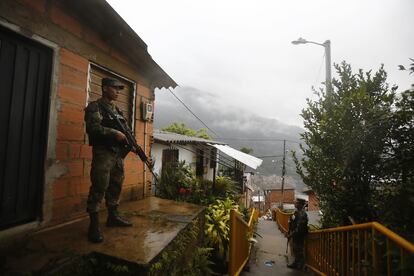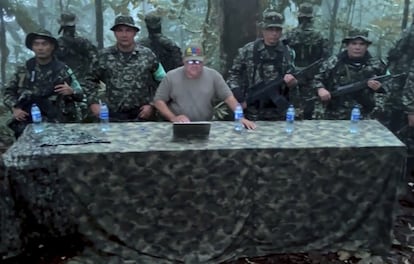Submission or political negotiation, the gap that separates the Colombian government from the Gulf Clan and ‘total peace’
President Gustavo Petro has opened the door to dialogue with the largest drug trafficking organization in the country, which presents itself as a ‘political-military organization’


“If they dare, we will open the negotiating tables,” said Colombian President Gustavo Petro, placing the ball in the court of the Gulf Clan, the drug trafficking organization that represents one of the biggest obstacles to the “total peace” policy proposed by his government. “But to dare is to dare to leave the illicit economy and illegality, and get into a difficult challenge, which is to transform this territory into a prosperous region,” Petro said earlier this week in Apartadó, Antioquia, one of the many areas where the country’s largest armed organized crime group operates.
Petro spoke of a “legal negotiation” and a “collective acceptance of justice,” which met an almost immediate response by the Gulf Clan. In a communiqué signed as the Gaitanista Self-Defense Forces of Colombia, the name it uses to refer to itself, the group agreed to sit down to “negotiate the political conditions that will allow the social transformations that we all want for the regions where we are present. Where the president insinuates a submission, the heads of the Clan outline a political negotiation. Despite this gap, the truth is that the government opens the door to dialogue with the heir group to the paramilitaries, the missing part of total peace, with which it intends to set in motion simultaneous processes with various illegal actors.”
Until now, Petro had threatened to destroy the Gulf Clan, emphasizing its criminal character: “[Jorge Eliécer] Gaitán was a revolutionary and not a rabble-rouser,” he said in Apartadó. Previous attempts at negotiation had not prospered. The Gulf Clan is responsible for around half of the drugs that have been trafficked from Colombia in recent years, and it is heavily involved in crimes such as extortion, illegal mining, and the appropriation of public resources through municipal administrations. The group is also involved in the record passage of migrants through the dangerous routes that cross the border separating Colombia and Panama, in the thick jungle of the Darién. Analysts agree that the Gulf Clan has a dominant position in the criminal world. In addition, it maintains open wars with the ELN guerrillas and the FARC dissidents of the Central General Staff (EMC), two groups that are negotiating with the government and have agreed bilateral ceasefires, although the process with the EMC has entered into crisis.

Including the Gulf Clan — led by Jesus Avila “Chiquito Malo” Villadiego after the capture and extradition of Dairo Antonio Úsuga, “Otoniel” — is fundamental to the aim of extinguishing the violence that still smolders in many parts of Colombia, as Petro has pledged. Two reports from prominent think tanks issued this week agreed in putting forward recommendations for eventual dialogue with a group that insists on presenting itself as a “political-military organization” and has grown from fewer than 4,000 members in 2018 to more than 6,000 today, a figure that some estimates place as high as 9,000.
Negotiating with Colombia’s largest armed group requires defining the place of subjugation within the government’s peace strategy, notes the Fundación Ideas para la Paz (FIP) in the report. “It is necessary to find an adequate balance between the possibility of generating a new legal framework for submission, which has clear and effective incentives for this group and, on the other hand, respects the autonomy and guidelines of the Prosecutor’s Office and the National Government regarding the possibilities of submission,” says the FIP.
From its stronghold on the Atlantic coast, where it controls some of the main drug-trafficking routes and migrant smuggling networks, the Gulf Clan exercises coercive control over numerous communities, states an International Crisis Group (ICG) report. “If they remain outside peace talks, they could undermine negotiations with other groups or capitalise on their demobilisation,” the report warns. “No other armed group is likely to contemplate laying down its arms for the duration while the Gaitanistas are poised to grab their former lands and businesses.” In other words, for total peace to succeed, the Gulf Clan needs to be brought into the negotiations, despite being considered a criminal group rather than a political insurgency.
Nothing in this process will be easy, concedes the ICG. “The government cannot attempt to take the final step (dismantling the Gaitanistas and their networks) without new legislation,” it notes. “If a legal path can be established, the state would still face difficulties in offering sufficient incentives to convince ex-combatants to leave criminal activities permanently while at the same time doing justice for the victims and not offending public opinion.” The two think tanks agree that the police and army should continue their operations to protect civilians and pressure the Gulf Clan to engage in talks. If the Clan has insisted on contacting both the government and the Attorney General’s Office, it is largely because of this deployment.
“In the end, this negotiation has to take place with the Attorney General’s Office. The terms are going to be the least important thing,” analyst Jorge Mantilla, an expert in armed conflict, criminal governance, and security, said of the possibility of political recognition. “Ultimately, in practical terms, it is a negotiation, only it is not political but judicial in exchange for justice, economic benefits, and guarantees,” he adds. These formulas involve issues of truth, justice, and reparation, which include the percentage of capital to be handed over, as well as guarantees of legal and physical security for those who decide to accept. With a little more than two years of his mandate remaining, time is running out to launch a new process in search of Petro’s elusive total peace.
Sign up for our weekly newsletter to get more English-language news coverage from EL PAÍS USA Edition
Tu suscripción se está usando en otro dispositivo
¿Quieres añadir otro usuario a tu suscripción?
Si continúas leyendo en este dispositivo, no se podrá leer en el otro.
FlechaTu suscripción se está usando en otro dispositivo y solo puedes acceder a EL PAÍS desde un dispositivo a la vez.
Si quieres compartir tu cuenta, cambia tu suscripción a la modalidad Premium, así podrás añadir otro usuario. Cada uno accederá con su propia cuenta de email, lo que os permitirá personalizar vuestra experiencia en EL PAÍS.
¿Tienes una suscripción de empresa? Accede aquí para contratar más cuentas.
En el caso de no saber quién está usando tu cuenta, te recomendamos cambiar tu contraseña aquí.
Si decides continuar compartiendo tu cuenta, este mensaje se mostrará en tu dispositivo y en el de la otra persona que está usando tu cuenta de forma indefinida, afectando a tu experiencia de lectura. Puedes consultar aquí los términos y condiciones de la suscripción digital.








































